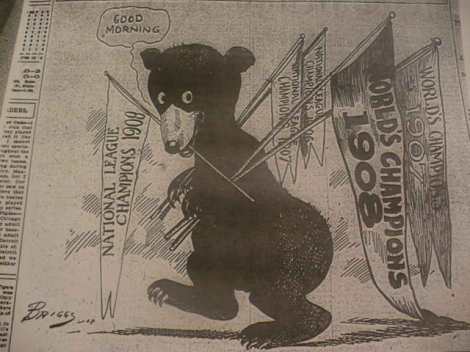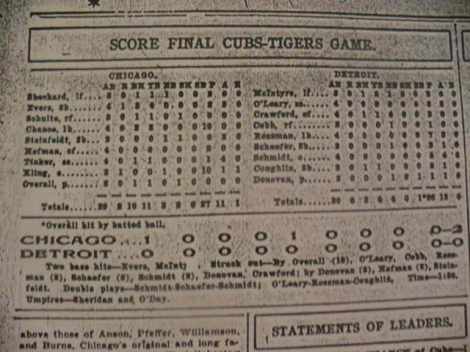Here’s some of the Chicago Tribune’s coverage of the Cubs winning their second World Series, on October 14, 1908.
A picture of the cub mascot at a time when the Chicago faithful were still building up their stockpile of pennants and world titles:

And a picture of the box score:

The headline read “CUBS SUPREME IN BASEBALL WORLD: Final Victory Over Detroit Gives Chicago Team Greatest Record in History of the Game,” but the Tribune’s story wasn’t that memorable. It said that Cubs pitcher Orval Overall “was extremely right. This was shown in the first inning, when he struck out four men, thereby establishing a new strikeout record for the majors.” It gave high praise for the Cubs’ defense: the Tinkers-Evers-Chance trio and other fielders. But it also said that “undoubtedly today’s final crowd of the year was the smallest that has watched a world’s series battle under modern conditions, the official count showing only a little over 6,000 fans despite ideal conditions.”
On the inside pages, a sidebar feature called “In the Wake of the Final Blow” and written by Hugh E. Keogh featured a poem based on Longfellow’s Excelsior and making fun of the Tigers’ manager, Hughie Jennings:
The shades of night were falling fast,
As through this subdued village passed
A Kike who bore mid snow and ice,
A banner with this strange device,
“Wee-e-ah.”
He pleaded with the passing throng
To help the goodly cause along;
He pleaded long and pleaded loud
Unto that dazed and saddened crowd.
“Wee-e-ah.”
But no one seemed to heed his call,
And no one care a thing at all,
And none would pay a nickel for
The emblem of a losing war.
“Wee-e-ah.”
“I’m long upon my stock,” he cried.
What time his losing trade he plied.
“Now I deserve some recompense;
Here, take the bunch for thirty cents.”
“Wee-e-ah.”
Cubs’ Manager Frank Chance: “Manager Jennings has a great team, but I think the Chicago team is greater. Our team is the greatest that I ever saw on a baseball field.”
The Tigers’ Jennings said: “There was not the old time Detroit dash and ginger to our work and we did not measure our full ability either at the plate or in the field.”
Other sidebar items:
“They are talking here tonight about the cheapness of the American league as compared with the National. The subject is too deep for these parts, but if our health holds out we shall have all winter to think about it.
“Gracious, how cheap we south siders look when we take the count from something that looks like a spoiled deuce when stacked up against a machine like this Frank Chance fell heir to! [Keogh meant the White Sox should be embarrassed to have lost the pennant to the Tigers when the Cubs beat Detroit so easily.]
“Those who hold reservations for tomorrow’s game in Chicago can retain them for the 1909 series. They will need them.
“After the terrible battles for the two major league pennants the world’s series was only a gentle skirmish by comparison, and probably will be known in history as the anti-climax series.”
Here’s a link to the Series stats, and coverage of the game 5 action.
In other Chicago Tribune front page news that day, “Rev. A.W. Griffin, rector of St. Peter’s Episcopal church, was exonerated yesterday of the charges preferred against him by choir boys.”
The investigation found 1. “The accused is charged with immoral but not criminal acts.”
2. “We consider that the accusation has not been proven by preponderance of the evidence with respect to any single immoral act.”
3. “Therefore, in our judgment, we are not warranted to present the said Rev. A.W. Griffin for trial.”
Also, in Wilkesbarre, Pa., the headline “TRAMP THRASHED BY A WOMAN Knight of Road Insults 275 Pound Amazon and Soon Becomes a Badly Whipped Person” introduced this story:
“Mrs. John Snyder of Riverside, who weighs 275 pounds, dusted the roadside with a tramp who had insulted her. . . . The tramp went to the Snyder farmhouse and after being given something to eat discovered Mrs. Snyder was alone and insulted her. Mrs. Snyder knocked him down, picked him up again, ran him to the road, held him wih one hand, and beat him with the other.”